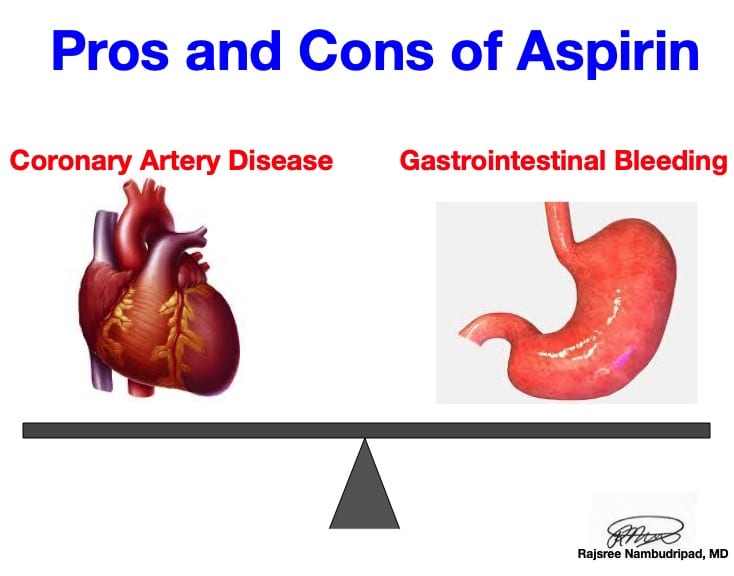
Should you be taking a baby aspirin daily to prevent heart disease? Aspirin prevents plaque and clots in your coronary arteries, but the downside is it is harsh on the stomach and can cause bleeding. If you are generally healthy, do not have diabetes, and have no known heart disease, the answer is NO! Aspirin is now only recommended if you have known heart disease or diabetes. If you are not sure, or if you have other risk factors, please come and see me and we can discuss the pros and cons specific to you.
Aspirin has a cool history. Did you know aspirin has been around since 1500 BC! It was first discovered as the willow bark and the ancient Egyptian medical texts from that time mention using it for fever and pain. In 400 BC Hippocrates in Greece used willow leaf tea to ease pain of women during childbirth. The active compound from willow called “salicin” was found to bring pain relief. In 1899, a well known drug company called Bayer formulated “acetylsalicylic acid” and began distribution worldwide as aspirin.
How does Aspirin work? It is a COX1 (cyclooxygenase-1) inhibitor. This means aspirin blocks the enzyme that converts arachidonic acid to prostaglandins (which cause inflammation, fever, and pain) and thromboxanes (which promote blood clotting). In 1982, John Vane, British pharmacologist and two others received the Nobel Prize in Medicine for their physiological explanation of aspirin’s inhibition of prostaglandins, as the mechanism for reduced pain, fever, and inflammation.
Sounds fabulous but there is a downside to aspirin. When you inhibit prostaglandin formation you put your stomach and intestines at higher risk of bleeding. I still recall the days of my fellowship in gastroenterology at UC Irvine when I was called to the ICU to stop massive GI hemorrhage in a patient taking a baby aspirin a day!
So who should be taking a baby aspirin a day? After attending the USC Keck School of Medicine Updates in Cardiovascular Diagnosis and Therapy this past weekend, I am excited to share the updated guidelines with you. A 2019 meta analysis published in JAMA shows that healthy patients should NOT take baby aspirin simply to prevent cardiovascular disease (risks outweigh benefits).
You can figure out your 10 year risk of atherosclerotic cardiovascular disease through the ASCVD score calculator.
If you are low risk (<7.5% ASCVD score), you do NOT need to take baby aspirin to prevent heart disease (risks outweigh benefits).
If you have known coronary artery disease, we DO recommend aspirin81 mg daily (benefits outweigh risks).
If you are diabetic, we generally DO recommend aspirin 81 mg daily, provided no bleeding history.
If you are moderate risk, it’s best to have a discussion with your doctor to best evaluate the pros and cons of aspirin specific for you.
If you have had a coronary artery calcium scan that is positive (shows some calcium deposition), it is safe to assume you likely have some plaque (coronary artery disease) and hence aspirin 81 mg should be strongly considered.
What about enteric coated aspirin? This is a form of aspirin with a coating that delays the release until after it has passed through the stomach. None of the studies were done with enteric coated aspirin! We also have to remember that aspirin can cause GI bleeding in places other than the stomach (like the small intestine or colon). Having said that, for those who do need to be on aspirin, I recommend the enteric coated form of baby aspirin 81 mg just to be on the safe side. Most importantly, ALWAYS TAKE ASPIRIN WITH FOOD (NEVER ON AN EMPTY STOMACH!)
Hope this discussion gives you some helpful insight on the background and long history of aspirin! I’m happy to discuss in more detail with you at your next visit to determine if aspirin is right for you.
Warmly,

Rajsree Nambudripad, MD











 Dr. Rajsree is a caring and compassionate physician, who is board-certified in both Internal Medicine and Integrative/Holistic medicine. She is passionate about helping patients optimize their health through a preventative approach involving healthy lifestyle, dietary changes, targeted nutritional supplementation, and optimizing hormones. Her practice is unique in the personalized attention she devotes to each and every patient.
Dr. Rajsree is a caring and compassionate physician, who is board-certified in both Internal Medicine and Integrative/Holistic medicine. She is passionate about helping patients optimize their health through a preventative approach involving healthy lifestyle, dietary changes, targeted nutritional supplementation, and optimizing hormones. Her practice is unique in the personalized attention she devotes to each and every patient.